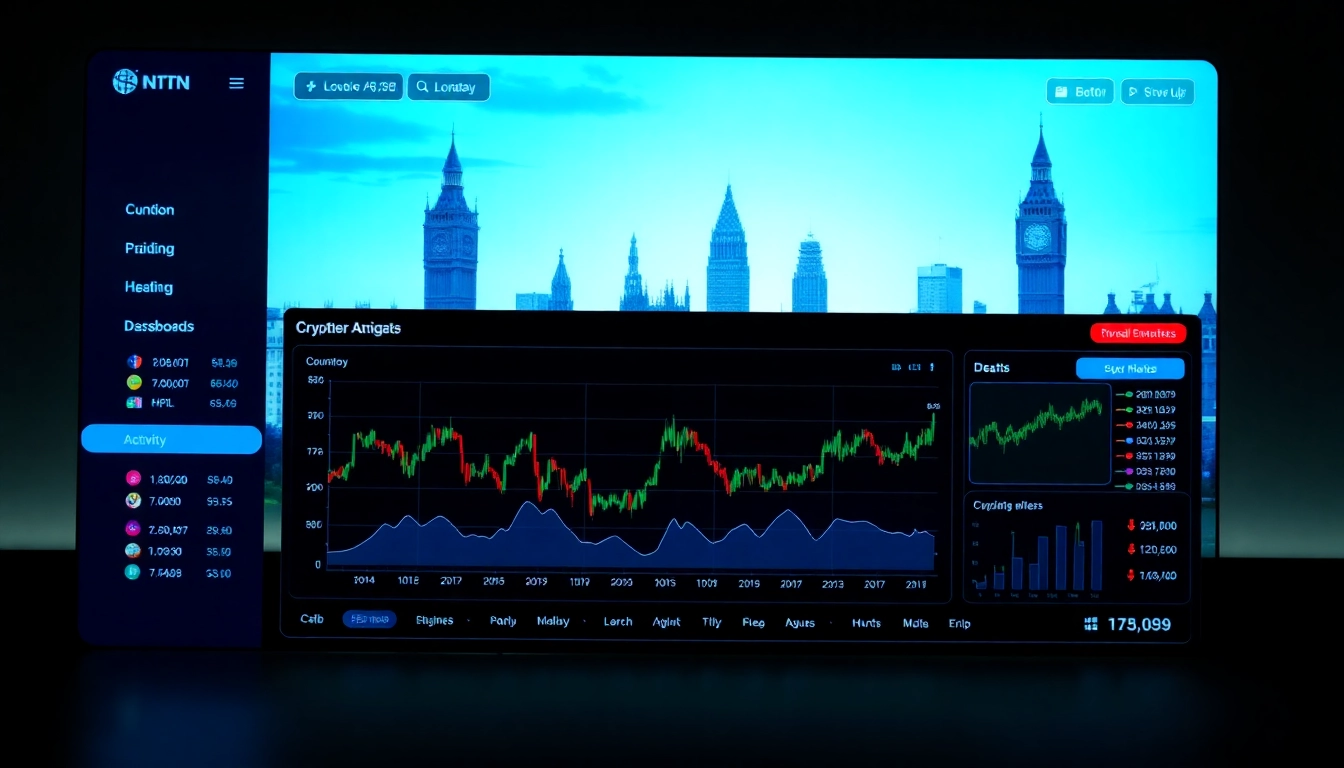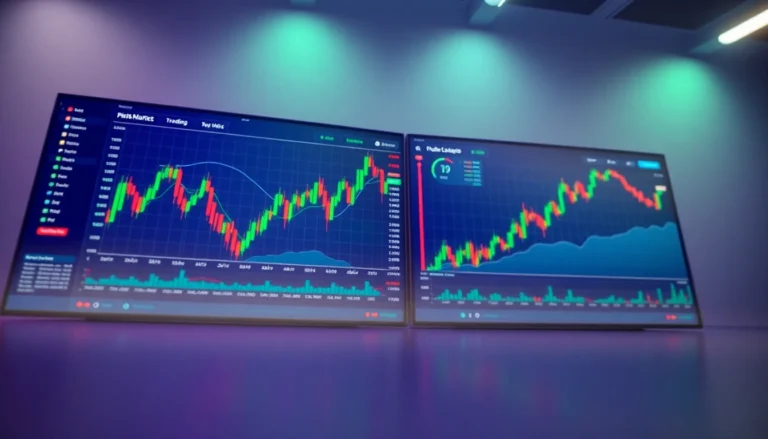Current State of Cryptocurrency Trading in London: Navigating a Dynamic Market
London continues to be a global nexus for financial innovation and cryptocurrency trading. Its vibrant ecosystem is increasingly shaped by recent developments, regulatory adjustments, and evolving technological integrations. For traders and investors seeking to capitalize on these trends, understanding the intricate landscape is essential. To stay ahead, it’s crucial to analyze market trends, regulatory environments, and technological advancements shaping London’s crypto scene. For comprehensive insights, visit Cryptocurrency Trading News London, where in-depth updates and expert analysis keep you informed of developments across the capital.
1. Overview of the Cryptocurrency Trading Landscape in London
1.1 Key Market Trends and Recent Developments in London
London’s cryptocurrency market remains highly dynamic, driven by increasing institutional interest and technological innovation. Over recent months, major platforms have expanded their offerings, integrating advanced features such as AI-driven trading tools and enhanced security protocols. Gold price records, stock market volatility, and currency fluctuations have influenced crypto valuations—highlighting Bitcoin’s resilience with several analysts suggesting a bullish trajectory if critical technical trendlines, like the 200-week moving average, hold. In addition, the proliferation of DeFi platforms and non-fungible tokens (NFTs) has created new avenues for traders, with NFT market caps soaring past $9.3 billion despite recent declines, illustrating both volatility and opportunity.
The growth of London’s crypto scene is also marked by increasing media attention, with local exchanges and banks adapting to regulatory reforms. Recent moves include UK-specific discussions on stablecoins, and the Bank of England’s cautious stance on new digital assets like Libra, emphasizing strict conditions before widespread adoption. These developments underscore London’s position as a leader in guiding responsible innovation amidst a global wave of digital currency integration.
1.2 How London’s Regulatory Environment Affects Cryptocurrency Trading
Regulation plays a pivotal role in shaping London’s crypto ecosystem. The UK authorities have maintained a balanced approach—aiming to nurture innovation while mitigating risks of money laundering and fraud. The Financial Conduct Authority (FCA) continues to oversee crypto exchanges, with recent alerts emphasizing the importance of anti-money laundering (AML) compliance. Notably, the FCA’s cautious stance on certain cryptocurrencies and stablecoins reflects a broader effort to align with international standards, especially considering recent discussions around digital currency regulations in the European Union and the U.S.
Furthermore, regulatory clarity surrounding the classification of cryptocurrencies as financial instruments influences trading strategies. London’s exchanges are actively engaging with regulators to streamline licensing processes, thus encouraging more institutional participation. While regulatory hurdles exist, such as strict licensing conditions for new offerings, they promote a safer trading environment that fosters investor confidence and market stability.
1.3 Major Platforms and Exchanges Operating in London
London hosts a vibrant array of cryptocurrency platforms, ranging from established global giants to innovative local startups. Notable examples include:
- Binance UK—offering wide-ranging services with comprehensive security measures.
- Coinbase—with its UK arm, providing user-friendly interfaces and robust compliance protocols.
- Bitstamp—serving institutional traders with high liquidity and advanced trading tools.
These platforms leverage London’s position as a financial hub, integrating AI and blockchain technologies to enhance user experiences. Moreover, with regulatory partnerships evolving, new players are entering the scene, offering tailored services like crypto custody, lending, and derivative trading—further expanding the market’s depth and breadth.
2. Influences of Global Economic Factors on London’s Crypto Markets
2.1 Influence of U.S. and European Policies on London Trading
Global economic policies significantly impact London’s crypto environment. Recent U.S. regulatory actions, including SEC crackdowns and discussions around stricter compliance, create a ripple effect that influences London traders and platforms. Conversely, European Central Bank (ECB) initiatives on digital euro and crypto regulations influence London’s strategic positioning within the broader European market. These policies affect liquidity, trading volumes, and price stability.
For instance, heightened regulatory scrutiny often triggers volatility, prompting traders to adjust positions accordingly. As London’s market operates in tandem with U.S. and European markets, global policy shifts necessitate a vigilant approach, leveraging local insights for strategic positioning.
2.2 Currency Fluctuations and Their Effect on Crypto Valuations
The strength of the British pound amid U.S. dollar movements significantly impacts crypto valuations in London. Recent currency declines due to economic uncertainties, like U.S. rate cut hopes and geopolitical tensions, have led traders to hedge via cryptocurrencies, which are often viewed as safe havens.
Analysts observe that a weaker GBP compared to USD tends to elevate Bitcoin and altcoin prices when priced in local currency, but also introduces additional volatility. Thus, traders need to monitor currency trends meticulously to capitalize on arbitrage opportunities or hedge risks effectively.
2.3 Geopolitical Events and Market Volatility in London
London’s markets are sensitive to geopolitical developments—ranging from Brexit implications to US-China tensions. Such events influence investor sentiment, leading to sharp market swings. Crypto trading in London often responds swiftly, with traders leveraging real-time data and news alerts to adapt strategies. For example, US-China trade tensions or geopolitical disputes tend to heighten demand for decentralized assets, boosting prices and trading volumes.
Steady engagement with global news and advanced analytics tools are essential for traders aiming to mitigate risks associated with these geopolitical shifts.
3. Strategies for Successful Cryptocurrency Trading in London
3.1 Technical Analysis and Market Indicators for London Traders
Successful trading hinges on mastering technical analysis. Key indicators include moving averages (e.g., 200-week trendline), RSI (Relative Strength Index), and MACD (Moving Average Convergence Divergence). London traders often employ a combination of these tools to identify entry and exit points, especially in volatile markets like Bitcoin and Ether.
For example, a Bitcoin price maintaining above its 200-week trendline suggests a bullish outlook, encouraging traders to buy or hold. Conversely, crossing below might signal caution and a potential sell-off. Weekly support and resistance levels, combined with news-related triggers, enhance decision-making processes.
3.2 Risk Management and Regulatory Compliance
Risk management is paramount, especially given the market’s volatility. Effective strategies include setting stop-loss orders, diversifying portfolios, and employing position sizing to prevent overexposure. Moreover, compliance with UK regulations—such as AML and KYC protocols—ensures that trading activities remain within legal boundaries, avoiding penalties and reputational damage.
Emerging traders benefit from automation tools that enforce risk parameters and record trade analytics, aiding continuous improvement and adherence to regulatory standards.
3.3 Capitalizing on Market Trends and News Alerts
Real-time news feeds and market alerts are invaluable. Traders who monitor developments, such as policy changes, macroeconomic data (e.g., US inflation reports), or significant corporate actions (like Meta exploring partnerships), can swiftly adapt their strategies to profit from short-term fluctuations.
Utilizing professional analytics platforms, combined with intuitive news aggregation tools, enables traders in London to remain agile amidst rapid market movements, especially with the current influx of institutional capital and technological innovation.
4. Future Trends and Innovations in Cryptocurrency Trading London
4.1 Adoption of AI and Blockchain Technologies in London’s Trading Scene
The integration of AI and blockchain is transforming London’s trading landscape. AI-powered R&D is expected to be the next leap in scientific and technological innovation, enabling predictive analytics, automated trading, and enhanced security. Major firms are already embedding external AI models into internal systems, improving decision accuracy and operational efficiency.
Furthermore, blockchain solutions help streamline settlements, reduce fraud, and facilitate transparent transactions—crucial for regulatory compliance and trust-building. As a result, London’s traders and institutions are increasingly adopting these innovations to stay competitive.
4.2 The Rise of Decentralized Finance (DeFi) in London
DeFi platforms are gaining traction for their permissionless lending, borrowing, and yield-generating capabilities. London’s active crypto landscape is ripe for DeFi expansion, driven by a demand for decentralized alternatives to traditional financial services. Challenges remain around security and regulatory oversight, but continuous innovation and investor education are fostering growth.
Investors who understand DeFi protocols and risk management can capitalize on high-yield opportunities, while regulators are exploring frameworks to ensure consumer protection without stifling innovation.
4.3 Predictions for Market Growth and Regulatory Changes
Industry experts anticipate sustained growth for London’s crypto sector, supported by technological advancements and favorable policy evolutions. Regulatory bodies are expected to finalize clearer frameworks around stablecoins, CBDCs, and institutional custody solutions, fostering greater confidence and participation.
Overall, the trajectory points to a more integrated and mature market, with London’s leadership role reinforced through innovation, strategic partnerships, and robust regulation.
5. Staying Updated with Cryptocurrency Trading News in London
5.1 Reliable News Sources and Market Reports for London Traders
Continuous education and information are vital to successful trading. Trusted sources include official regulatory updates, market analytics firms, and industry-leading publications. Regularly consulting reports on market cap changes, price movements, and policy shifts enables traders to make informed decisions.
London-based traders should prioritize sources that analyze global influences, as well as local regulatory updates, ensuring a comprehensive view of potential market impacts.
5.2 Participating in Local Crypto Events and Communities
Engaging with London’s crypto community through seminars, webinars, and meetups fosters networking, knowledge sharing, and access to insider insights. These events often feature industry experts, regulatory officials, and innovative startups sharing perspectives on market trends and technological advances.
Participation helps traders stay connected with evolving industry standards, emerging projects, and best practices, giving them a competitive edge.
5.3 Utilizing Tools and Alerts to Track Cryptocurrency Movements
Advanced tools like real-time price alerts, news aggregation platforms, and technical analysis apps enable traders to respond promptly to market stimuli. Automated alerts for currency fluctuations, regulatory announcements, or significant trade volumes help traders in London implement timely strategies.
In summary, leveraging technological tools and active engagement with reliable news sources is essential to thrive in London’s fast-paced crypto trading environment.







